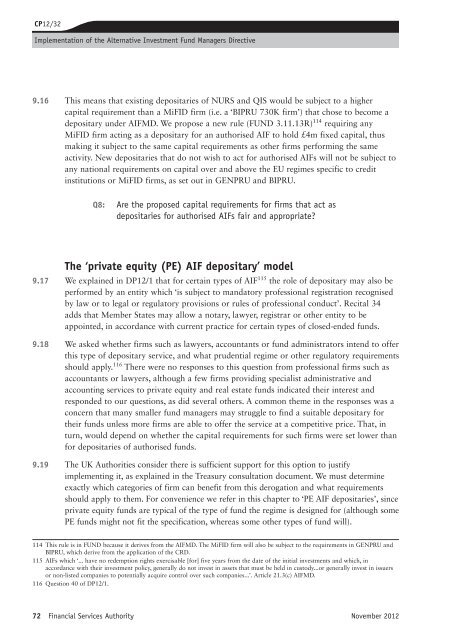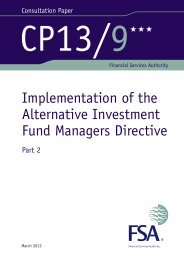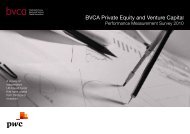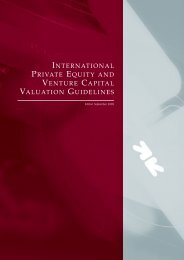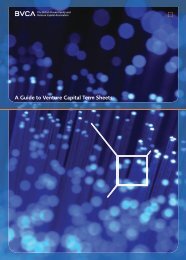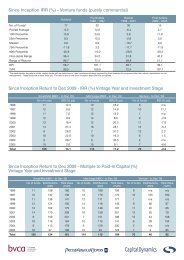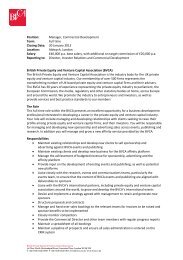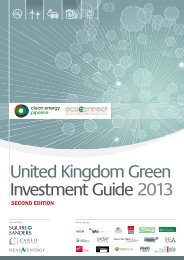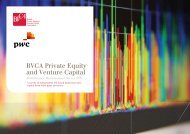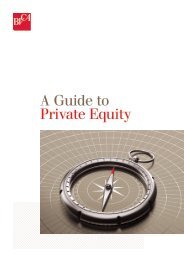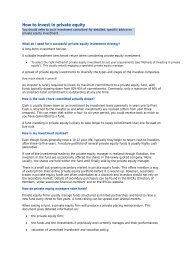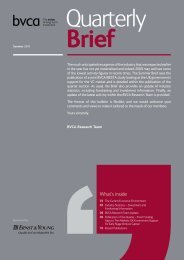CP12/32: Implementation of the Alternative ... - BVCA admin
CP12/32: Implementation of the Alternative ... - BVCA admin
CP12/32: Implementation of the Alternative ... - BVCA admin
You also want an ePaper? Increase the reach of your titles
YUMPU automatically turns print PDFs into web optimized ePapers that Google loves.
<strong>CP12</strong>/<strong>32</strong><br />
<strong>Implementation</strong> <strong>of</strong> <strong>the</strong> <strong>Alternative</strong> Investment Fund Managers Directive<br />
Annex X<br />
9.16 This means that existing depositaries <strong>of</strong> NURS and QIS would be subject to a higher<br />
capital requirement than a MiFID firm (i.e. a ‘BIPRU 730K firm’) that chose to become a<br />
depositary under AIFMD. We propose a new rule (FUND 3.11.13R) 114 requiring any<br />
MiFID firm acting as a depositary for an authorised AIF to hold £4m fixed capital, thus<br />
making it subject to <strong>the</strong> same capital requirements as o<strong>the</strong>r firms performing <strong>the</strong> same<br />
activity. New depositaries that do not wish to act for authorised AIFs will not be subject to<br />
any national requirements on capital over and above <strong>the</strong> EU regimes specific to credit<br />
institutions or MiFID firms, as set out in GENPRU and BIPRU.<br />
Q8: Are <strong>the</strong> proposed capital requirements for firms that act as<br />
depositaries for authorised AIFs fair and appropriate?<br />
The ‘private equity (PE) AIF depositary’ model<br />
9.17 We explained in DP12/1 that for certain types <strong>of</strong> AIF 115 <strong>the</strong> role <strong>of</strong> depositary may also be<br />
performed by an entity which ‘is subject to mandatory pr<strong>of</strong>essional registration recognised<br />
by law or to legal or regulatory provisions or rules <strong>of</strong> pr<strong>of</strong>essional conduct’. Recital 34<br />
adds that Member States may allow a notary, lawyer, registrar or o<strong>the</strong>r entity to be<br />
appointed, in accordance with current practice for certain types <strong>of</strong> closed-ended funds.<br />
9.18 We asked whe<strong>the</strong>r firms such as lawyers, accountants or fund <strong>admin</strong>istrators intend to <strong>of</strong>fer<br />
this type <strong>of</strong> depositary service, and what prudential regime or o<strong>the</strong>r regulatory requirements<br />
should apply. 116 There were no responses to this question from pr<strong>of</strong>essional firms such as<br />
accountants or lawyers, although a few firms providing specialist <strong>admin</strong>istrative and<br />
accounting services to private equity and real estate funds indicated <strong>the</strong>ir interest and<br />
responded to our questions, as did several o<strong>the</strong>rs. A common <strong>the</strong>me in <strong>the</strong> responses was a<br />
concern that many smaller fund managers may struggle to find a suitable depositary for<br />
<strong>the</strong>ir funds unless more firms are able to <strong>of</strong>fer <strong>the</strong> service at a competitive price. That, in<br />
turn, would depend on whe<strong>the</strong>r <strong>the</strong> capital requirements for such firms were set lower than<br />
for depositaries <strong>of</strong> authorised funds.<br />
9.19 The UK Authorities consider <strong>the</strong>re is sufficient support for this option to justify<br />
implementing it, as explained in <strong>the</strong> Treasury consultation document. We must determine<br />
exactly which categories <strong>of</strong> firm can benefit from this derogation and what requirements<br />
should apply to <strong>the</strong>m. For convenience we refer in this chapter to ‘PE AIF depositaries’, since<br />
private equity funds are typical <strong>of</strong> <strong>the</strong> type <strong>of</strong> fund <strong>the</strong> regime is designed for (although some<br />
PE funds might not fit <strong>the</strong> specification, whereas some o<strong>the</strong>r types <strong>of</strong> fund will).<br />
114 This rule is in FUND because it derives from <strong>the</strong> AIFMD. The MiFID firm will also be subject to <strong>the</strong> requirements in GENPRU and<br />
BIPRU, which derive from <strong>the</strong> application <strong>of</strong> <strong>the</strong> CRD.<br />
115 AIFs which ‘... have no redemption rights exercisable [for] five years from <strong>the</strong> date <strong>of</strong> <strong>the</strong> initial investments and which, in<br />
accordance with <strong>the</strong>ir investment policy, generally do not invest in assets that must be held in custody...or generally invest in issuers<br />
or non-listed companies to potentially acquire control over such companies...’. Article 21.3(c) AIFMD.<br />
116 Question 40 <strong>of</strong> DP12/1.<br />
72 Financial Services Authority November 2012


